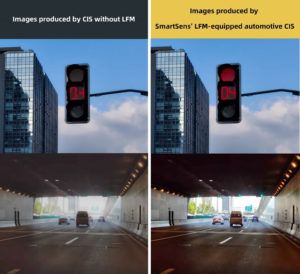SmartSens, a leading Chinese supplier of high-performance CMOS (Complementary Metal Oxide Semiconductor) imaging systems, has released proprietary LED Flicker Suppression (LFS) technology that can help make AI-enabled Advanced Driver-Assistance Systems (ADAS) and Autonomous Vehicles (AVs) much safer than before.
With the new technology innovatively implemented, SmartSens’ CMOS image sensors can effectively mitigate the dangers that often accompany ‘LED flicker’. LED has gradually replaced traditional lighting options in various automotive applications, such as traffic lights, vehicle headlamps and turn signals, by virtue of its high performance, exceptional stability, long life span and other advantages. However, since LED driver units often use Pulse Width Modulation (PWM) signals, LED lights actually ‘flicker’ at frequencies imperceptible to the unaided human eye. For CMOS image sensors that have even faster shutter speeds, mismatch between exposure time and LED pulse could lead to sensors picking up inaccurate visual signals. For automotive applications that prioritize safety, this is unacceptable.
With AVs globally attaining SAE Level 4 and 5 capabilities, cars increasingly rely on CMOS image sensors making accurate readings to correctly assess road conditions and position, a necessary prerequisite for AI systems to compute optimal next steps. This means that automotive CMOS image sensors must adapt to modern traffic signal systems by being able to distinguish between the on and off states of LEDs. While various CMOS manufacturers have introduced their own solutions to this issue, SmartSens has opted for a more distinct approach, innovatively using its proprietary QCell technology to effectively mitigate LED flickering. Beyond simply solving the LED flicker issue, this solution has the added benefit of increasing a sensor’s sensitivity and dynamic range, making it ideal for dim or fluctuating lighting situations, such as the openings of carports and tunnels.
“LED Flicker Suppression is a feature that all automotive CMOS sensors should possess, but is in fact not so easy to achieve,” said Chris Yiu, SmartSens CMO. “In the future, CMOS sensors that we produce for the automotive electronics market will all come equipped with LFS technology, upgrading our clients’ systems to be much more adaptable; and safer.”
The CEO of China’s Bovo Technology Group, Yuan Peng Zhang, said, “As a supplier of automotive parts and systems, we have always paid close attention to the development of CMOS image sensors (CIS). We look forward to the LFS-equipped CMOS sensors that SmartSens will be releasing, and we believe that these sensors are instrumental in making vehicles, especially autonomous ones, safer and smarter than ever before.”





